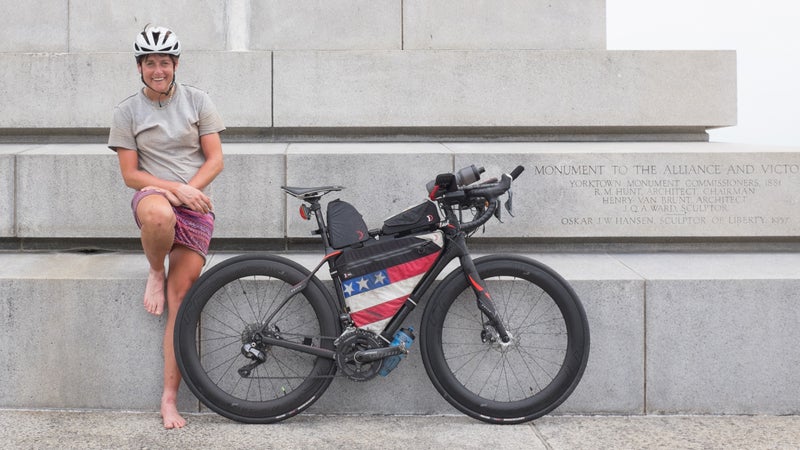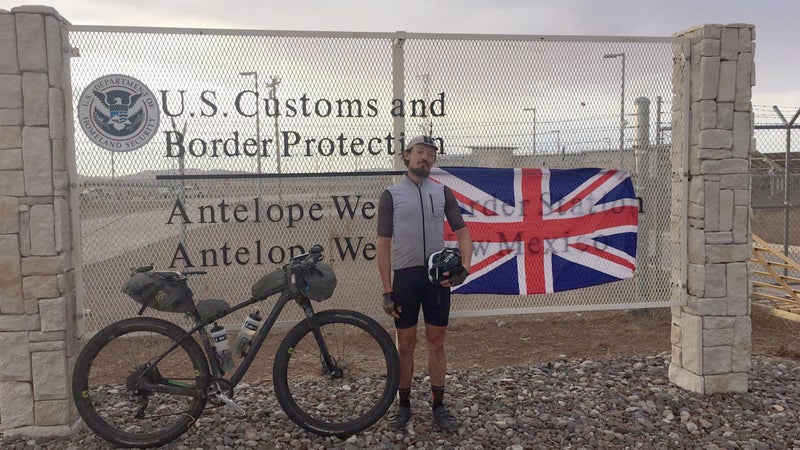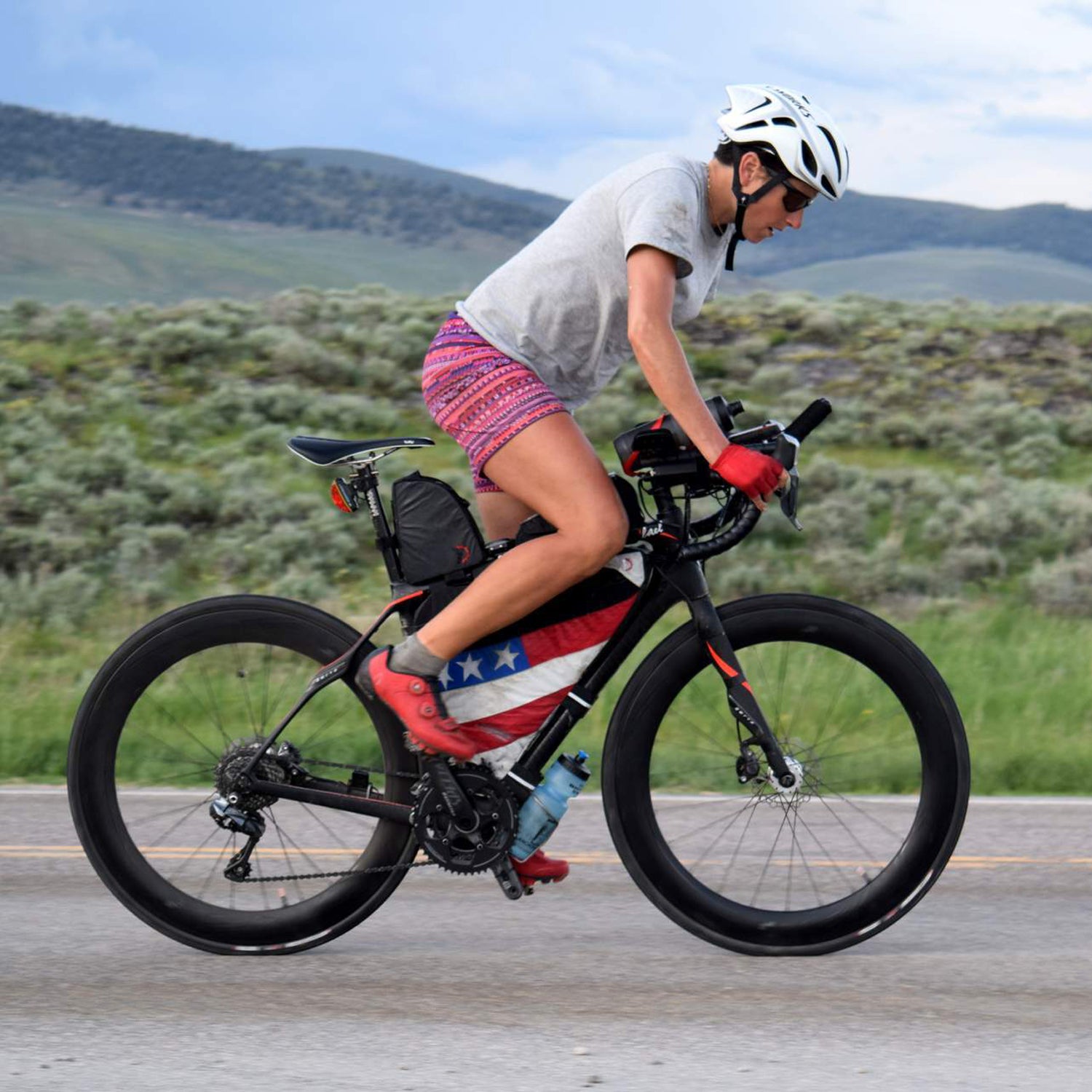While all eyes in the cycling world are on Chris Froome, Nairo Quintana, and Alberto Contador at SaturdayŌĆÖs start of the Grand Boucle, two amateur racers notched record rides this week that would make those Tour contenders weary.
Lael Wilcox won the third edition of the , beating 65 riders in the 4,400-mile self-supported coast-to-coast ride to finish in a time of 18 days and 10 minutes. The time bests the previous womenŌĆÖs record by over two and a half days and gives Wilcox the second-fastest ever time on the course.
Though Wilcox is no newcomer to endurance racingŌĆöshe┬Ābeat the womenŌĆÖs record on the Tour Divide last seasonŌĆöthe Trans Am win is especially impressive because it was the 29-year-oldŌĆÖs first-ever road race. ŌĆ£Before this, I really hadnŌĆÖt spent much time on a road bike. I was surprised how hard it is and how different it was to mountain biking,ŌĆØ she said after the race. ŌĆ£I liked road riding. I just feel like I have so much to learn still.ŌĆØ
The race, which follows the TransAmerica Trail from Astoria, Oregon, to Yorktown, Virginia, played out with more twists and intrigue than the average endurance event, as Wilcox struggled in the first week. ŌĆ£I started the race thinking I might be able to win it, but then I was running like 150 miles behind the leaders because I was riding it all wrong. I was riding the climbs too hard, then I was all whipped out on the flats and losing time,ŌĆØ she says. ŌĆ£I had to change strategy. I thought there was no way I could win, and I was just trying to maintain my position.ŌĆØ
Meanwhile, at the head of the race, Australian Sarah Hammond and Steffan Streich of Greece were putting in formidable rides. Hammond eventually had some navigation issues and fell off the pace, and Wilcox kept plugging away and moved into second. But Streich looked like a lock for the win, with a commanding lead of around 50 miles leading into the final day.
However, Streich was having difficulties with an ailing GPS and was also suffering from repeated nights with just one hour of sleep. On the final night, after waking from a nap, he made a shocking mistake, heading backwards on the course toward Wilcox. She describes seeing a bright light coming at her on the final night and wondering whether it was a fan who had come out to cheer her. ŌĆ£It was really confusing. This cyclist passed me, then looped around and caught back up,ŌĆØ Wilcox recounts. ŌĆ£He looked like a racer but I had never seen him before, so I asked him his name. When he told me he was Stefan, I just started sprinting, riding really aggressively. I realized that was my chance.ŌĆØ
The two rode a few hours together and, according to Wilcox, Streich suggested that, having battled for two weeks, they should ride to the finish together for a gentlemanŌĆÖs tie. ŌĆ£I said, ŌĆśNo way,ŌĆÖŌĆØ Wilcox explains. ŌĆ£This is a race. IŌĆÖm racing to the finish.ŌĆØ Wilcox eventually distanced the Greek and took the win by a commanding two hours.
ŌĆ£IŌĆÖm not surprised that a woman won this race, though I am surprised it was me,ŌĆØ Wilcox says of beating a field stacked with men. She says she was convinced early on that Sarah Hammond would win the overall. The Australian eventually finished sixth. ŌĆ£ThereŌĆÖs so many skills you bring to racing like this, and I think it really levels the playing field. IŌĆÖve said it before, but I think this proves that women can be just as fast as men in endurance races.ŌĆØ

The only rider to have ever ridden the Trans Am faster than Wilcox is Mike Hall, who won the 2013┬Āedition and holds the course record of 17 days, 16 hours, and 17 minutes. Just a few days after Wilcox wrapped up her 2016 Trans Am win, Hall set a new course record of his own on the .
It was the BritonŌĆÖs third finish on the 2,745-mile self-supported mountain bike race from Banff, Canada, to Antelope Wells, New Mexico, and his time of 13 days, 22 hours, and 51 minutes bests by over half a day the record that Josh Kato established last year.

The win wraps up a bit of unfinished business for Hall, who won the race in 2013┬Ābut was denied the official record because forest fires forced racers to detour around parts of the route in New Mexico. ŌĆ£At the time I wasnŌĆÖt too bothered about the record because I had demonstrated that I had gone a lot quicker than anyone else,ŌĆØ Hall says. ŌĆ£That year, I let off the gas at the end. There wasnŌĆÖt anyone chasing me and I knew I couldnŌĆÖt have the record. But then last year, JoshŌĆÖs time was only 18 minutes quicker than my ride in 2013. So I felt like I really needed to come back.ŌĆØ
At this yearŌĆÖs race, Kato was running a strong second during the first few days but was forced out after he suffered a knee injury from a pickup truck running him off the road in Montana. Hall wasnŌĆÖt carrying any sort of mobile device, but he says that he found out about KatoŌĆÖs misfortune and elimination quickly from bystanders on the route. He says heŌĆÖd have preferred to have had Kato in the race throughout.
ŌĆ£I knew very well the schedule that I needed to be keeping based on my past rides,ŌĆØ Hall says. ŌĆ£But having someone pushing you from behind certainly keeps you a lot more on your toes. As it was, I found myself falling off the pace and then having to push really hard to get back on the schedule.ŌĆØ
According to Hall, it was a tougher year for a record run this year than in 2013┬Ābecause of wet conditions up north. He moved slower than heŌĆÖd hoped in the initial days and was forced to make up the time by slashing his sleep time. In the end he estimates he was about 90 percent as fast as he could have been, though he was pleased enough with the result that he says heŌĆÖs unlikely to do the race again anytime soon.
ŌĆ£While I was out there, I was thinking this should be my last Tour Divide because itŌĆÖs quite painful. Sometimes itŌĆÖs just mentally quite challenging, your hands might be going numb, or your back might be aching. ItŌĆÖs the torment of never being comfortable for so long,ŌĆØ he says. ŌĆ£Now IŌĆÖve finished, I do feel that connection with the course. And I miss it a little bit. But I need a goal to chase if IŌĆÖm going to come again.ŌĆØ
When asked whether he would return if someone bested his course record, Hall pulls no punches: ŌĆ£That would certainly be something to think about.ŌĆØ And could a woman beat the time? ŌĆ£Why not?ŌĆØ he says. ŌĆ£It was amazing to watch the TransAm this year, and I think itŌĆÖs really good for cycling to have an event where women and men are fighting together for the top spots. And not just one woman but two [referring to Wilcox and Hammond]. ThatŌĆÖs exciting because itŌĆÖs something you donŌĆÖt see in other sports. It gives this kind of racing an edge. ThereŌĆÖs something in it that other sports donŌĆÖt have. ItŌĆÖs just brilliant.ŌĆØ
The same, of course, should be said of Hall, who now holds the records on two of the most prestigious self-supported bike races in the world.


